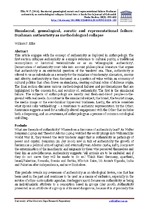Simulacral, genealogical, auratic and representational failure: Bushman authenticity as methodological collapse
Abstract
This article engages with the concept of authenticity as deployed in anthropology. The first section critiques authenticity as a simple reference to cultural purity, a traditional isomorphism or historical verisimilitude or as an ‘ethnographic authenticity’. Demarcation of authenticity must take into account philosophical literature that argues that authenticity is an existential question of the ‘modern’ era. Thus, authenticity is offered to us as individuals as a remedy for the maladies of modernity: alienation, anomie and alterity. Authenticity is then discussed as a question of value within an economy of cultural politics that often draws on simulacra, creating cultural relics of dubious origin. The final section discusses various methodological failures and problematiques that are highlighted by the concern for, and scrutiny of, authenticity. The first is the simulacral failure. The subjects of anthropology are mostly real flesh-and-blood people-on-the-ground with real needs. In contrast is the simulacral subject, the brand, the tourist image, the media image or the ever-familiar hyper-real bushmen. Lastly, the article considers what Spivak calls ‘withholding’ – a resistance to authentic representation by the Other. Resistance suggests a need for a radically altered engagement with the Other that includes both a deepening, and an awareness, of anthropology as a process of common ontological unfolding.

